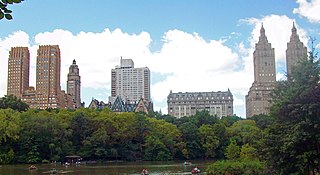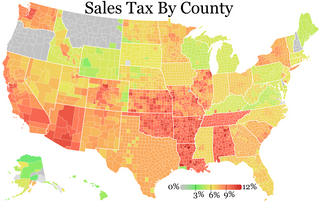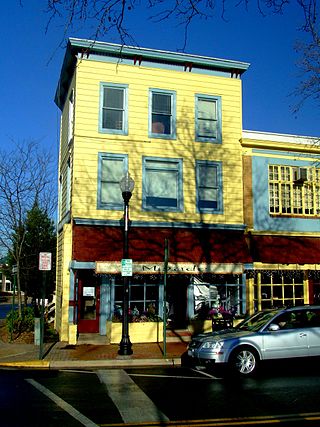Related Research Articles

An apartment, flat, or unit is a self-contained housing unit that occupies part of a building, generally on a single story. There are many names for these overall buildings. The housing tenure of apartments also varies considerably, from large-scale public housing, to owner occupancy within what is legally a condominium or leasehold, to tenants renting from a private landlord.
This aims to be a complete list of the articles on real estate.
A property tax is an ad valorem tax on the value of a property.

A condominium is an ownership regime in which a building is divided into multiple units that are either each separately owned, or owned in common with exclusive rights of occupation by individual owners. These individual units are surrounded by common areas that are jointly owned and managed by the owners of the units. The term can be applied to the building or complex itself, and is sometimes applied to individual units. The term "condominium" is mostly used in the US and Canada, but similar arrangements are used in many other countries under different names.

Real estate agents and real estate brokers are people who represent sellers or buyers of real estate or real property. While a broker may work independently, an agent usually works under a licensed broker to represent clients. Brokers and agents are licensed by the state to negotiate sales agreements and manage the documentation required for closing real estate transactions.

A housing cooperative, or housing co-op, is a legal entity which owns real estate consisting of one or more residential buildings. The entity is usually a cooperative or a corporation and constitutes a form of housing tenure. Typically housing cooperatives are owned by shareholders but in some cases they can be owned by a non-profit organization. They are a distinctive form of home ownership that have many characteristics that differ from other residential arrangements such as single family home ownership, condominiums and renting.
As a legal term, ground rent specifically refers to regular payments made by a holder of a leasehold property to the freeholder or a superior leaseholder, as required under a lease. In this sense, a ground rent is created when a freehold piece of land is sold on a long lease or leases. The ground rent provides an income for the landowner. In economics, ground rent is a form of economic rent meaning all value accruing to titleholders as a result of the exclusive ownership of title privilege to location.

For sale by owner (FSBO) is the process of selling real estate without the representation of a broker or agent. This is where the homeowner sells directly to a new homeowner. Homeowners may still employ the services of marketing, online listing companies, but can also market their own property.
Closing costs are fees paid at the closing of a real estate transaction. This point in time called the closing is when the title to the property is conveyed (transferred) to the buyer. Closing costs are incurred by either the buyer or the seller.

Sales taxes in the United States are taxes placed on the sale or lease of goods and services in the United States. Sales tax is governed at the state level and no national general sales tax exists. 45 states, the District of Columbia, the territories of Puerto Rico, and Guam impose general sales taxes that apply to the sale or lease of most goods and some services, and states also may levy selective sales taxes on the sale or lease of particular goods or services. States may grant local governments the authority to impose additional general or selective sales taxes.

Commercial property, also called commercial real estate, investment property or income property, is real estate intended to generate a profit, either from capital gains or rental income. Commercial property includes office buildings, medical centers, hotels, malls, retail stores, multifamily housing buildings, farm land, warehouses, and garages. In many U.S. states, residential property containing more than a certain number of units qualifies as commercial property for borrowing and tax purposes.

Multifamily residential, also known as multidwelling unit (MDU), is a classification of housing where multiple separate housing units for residential inhabitants are contained within one building or several buildings within one complex. Units can be next to each other, or stacked on top of each other. Common forms include apartment building and condominium, where typically the units are owned individually rather than leased from a single building owner. Many intentional communities incorporate multifamily residences, such as in cohousing projects.
Leaseback, short for "sale-and-leaseback", is a financial transaction in which one sells an asset and leases it back for the long term; therefore, one continues to be able to use the asset but no longer owns it. The transaction is generally done for fixed assets, notably real estate, as well as for durable and capital goods such as airplanes and trains. The concept can also be applied by national governments to territorial assets; prior to the Falklands War, the government of the United Kingdom proposed a leaseback arrangement whereby the Falklands Islands would be transferred to Argentina, with a 99-year leaseback period, and a similar arrangement, also for 99 years, had been in place prior to the handover of Hong Kong to mainland China. Leaseback arrangements are usually employed because they confer financing, accounting or taxation benefits.
Property finders are companies and individuals representing a buyer in a property transaction. The term is more common in the United Kingdom, but in the United States the situation is referred to as buyer brokerage, and in Australia it is known as buyer advocacy.
A gross lease is a type of commercial lease where the tenant pays a flat rental amount, and the landlord pays for all operating expenses regularly incurred by the ownership, including taxes, electricity and water. Most apartment leases resemble gross leases. The term "gross lease" is distinguished from the term "net lease."

A common area is, in real estate or real property law, the "area which is available for use by more than one person..." The common areas are those that are available for common use by all tenants, (or) groups of tenants and their invitees. In Texas and other parts of the United States, it is "An area inside a housing development owned by all residents or by an overall management structure which charges each tenant for maintenance and upkeep."
The term condop in real estate refers to a mixed-use condominium building where at least one of the units is owned by a cooperative corporation and sub-divided into many "co-op" apartments. The other condo units are typically retained or sold separately by the developer and may be retail space, office space or parking garage.

1049 Fifth Avenue is a 23-floor luxury condominium apartment building located in the Upper East Side of Manhattan in New York City. Built in 1928 as the Adams Hotel, the building underwent extensive renovation in its conversion to residential condominiums during the years 1990–1993. When the apartments were first offered for sale in 1991, they were the highest-priced residential apartments ever listed in New York City. Their sale prices set city records in 1993 and 1994.
Real estate is property consisting of land and the buildings on it, along with its natural resources such as growing crops, minerals or water, and wild animals; immovable property of this nature; an interest vested in this (also) an item of real property, buildings or housing in general. In terms of law, real relates to land property and is different from personal property, while estate means the "interest" a person has in that land property.

Trump Plaza is a 36-story cooperative apartment and retail building at 167 East 61st Street on the Upper East Side of Manhattan, New York City. The property, designed by Philip Birnbaum and named after Donald Trump, opened in 1984 at a cost of $125 million.
References
- ↑ "Understanding Flip Taxes". Council of Cooperatives and Condominiums in New York City. Autumn 2002. Retrieved 2016-05-03.
- ↑ Romano, Jay (15 February 2005). "A Condo 'Flip Tax'? Lawyers Say Yes". The New York Times. Retrieved 2016-05-03.
- ↑ Coppolo, George (21 February 2008). "Condominiums: Flip Taxes" . Retrieved 2016-05-03.